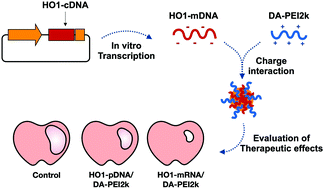Messenger RNA/polymeric carrier nanoparticles for delivery of heme oxygenase-1 gene in the post-ischemic brain†
Abstract
Ischemic stroke is a cerebrovascular disease caused by narrowed cerebral arteries. Thrombolytic agents such as tissue-plasminogen activators have been used for recanalization of the blood supply into the ischemic region. However, ischemia–reperfusion damage continues to increase the infarction volume. In this study, heme oxygenase-1 (HO1)-mRNA was delivered into the brain, using a non-viral carrier. Various non-viral carriers such as polyethylenimine (25 kDa, PEI25k), lipofectamine, dexamethasone-conjugated PEI2k (Dexa-PEI2k), deoxycholic acid-conjugated PEI2k (DA-PEI2k), and R3V6 peptides were evaluated as carriers of mRNA into the brain. Gene delivery assays showed that DA-PEI2k and lipofectamine had a higher mRNA delivery efficiency than the other carriers in Neuro2A cells in vitro and a rat brain in vivo. Cytotoxicity assays showed that lipofectamine had higher toxicity than DA-PEI2k. Therefore, DA-PEI2k was used for delivery of HO1-mRNA. Unlike plasmid DNA (pDNA), mRNA is expressed in the cytosol without nuclear translocation. This suggests that mRNA may have higher gene expression than pDNA, since the nuclear location of pDNA is an inefficient step. Indeed, in in vitro transfection assays, HO1-mRNA/DA-PEI2k had higher gene expression than HO1-pDNA/DA-PEI2k without induction of a pro-inflammatory cytokine. The therapeutic effects of HO1-mRNA delivery using DA-PEI2k were evaluated in the middle cerebral artery occlusion animal model after local injection. HO1-mRNA delivery had higher gene expression than HO1-pDNA delivery 24 h after the local injection. In addition, HO1-mRNA delivery reduced the infarct size more efficiently than HO1-pDNA delivery. The results suggest that the delivery of mRNA using DA-PEI2k may be useful for gene therapy of ischemic stroke.



 Please wait while we load your content...
Please wait while we load your content...